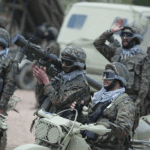French President Emmanuel Macron announced on Thursday that his country would provide Lebanon with 100 million euros, as Paris hosted an aid conference with ambitious financial goals but limited diplomatic prospects.
Mr. Macron stated that the war must end as soon as possible and there must be a ceasefire in Lebanon.
The Lebanese government chief, in turn, called on “the international community to hold together and support efforts, to implement an immediate ceasefire”.
France aims to raise half a billion euros ($540 million) in aid for Lebanon, 100 million more than the initial UN plea.

In addition to its financial contribution, Macron stated that Paris would “contribute to equipping the Lebanese army” to re-establish control of the country’s south in accordance with UN Security Council Resolution 1701, which ended the previous Israel-Hezbollah war in 2006.
Paris is also seeking an increase in humanitarian aid for a country to which it has historic ties and which has a large diaspora in France.
The latest conflict between Israel and Lebanon’s Hezbollah has so far claimed more than 1,550 lives, according to latest report.
Israel launched a ground offensive against Iran-backed Hezbollah in southern Lebanon in late September, having exchanged fire over the border for a year following Hamas’ October 7, 2023, attack.
Macron opened the conference following a one-on-one meeting on Wednesday with Lebanon’s Mikati, while Germany and Canada have sent their foreign ministers Annalena Baerbock and Melanie Joly.
Germany said that it would contribute 96 million euros to the humanitarian aid appeal.
Host France is pushing for progress on three fronts— diplomacy, humanitarian aid and Lebanon’s domestic politics.
France has pushed alongside the United States for a temporary 21-day ceasefire to give space to negotiate a more lasting truce.
Diplomacy offers “the only viable solution for Lebanon as well as for Israel”, where 60,000 people have also fled their homes, Barrot said.
The limited US presence and lack of Israeli or Iranian participation limits prospects for progress.














